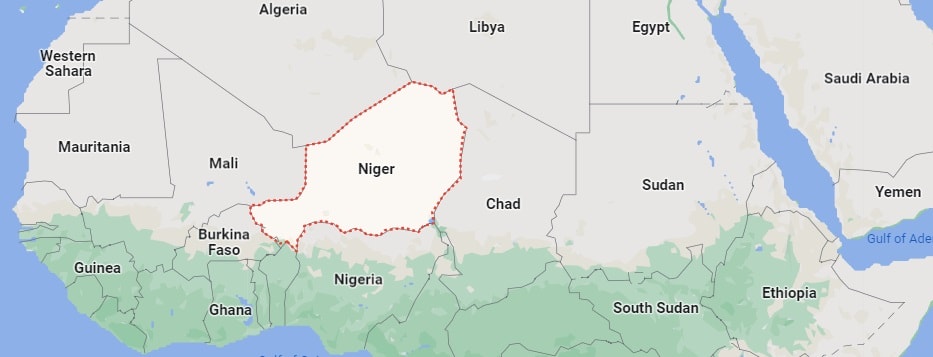While much of the developed world is focused on other matters, whether it be government elections, the Ukraine invasion, getting control of inflation, or a rise in COVID, there lurks another global risk that is not getting adequate attention: The coup in Niger.
Immediate developments in Niger and West African responses are covered in terms of today or tomorrow, or perhaps looking ahead a few weeks or months; what is not are the broader implications that should warrant attention and deep concern – long-term concern for geopolitical implications far beyond Africa.
Let us explain: there are prospects for imminent spillover effects to its neighbors Chad, Benin, Burkina Faso, Mali, and Nigeria; and subsequently well beyond, entailing disruptions throughout West, North, and East Africa.
This will undo the development of greater cohesiveness in the sub-region such as the Economic Community of West African States (ECOWAS) or the continent as a whole with the Africa Union (AU).
Expect increased extreme Islamization with seeds of a drive to create a new caliphate reaching from the Atlantic to the Red Sea and the Indian Ocean, and a sequence of events that triggers heightened internal African and external massive migration to Europe, setting off major internal civil strife in especially the richer European Union (EU) countries.
The geography of just the West-Central-Eastern African countries likely to be involved is breathtaking: It is equivalent to the total size of the U.S. (without Alaska) or equal in size to Brazil and larger than Australia.

Such vastness of the terrain, much of it unpopulated and ripe for terrorist encampment, is worrying Western political and military strategists, with enormous implications in terms of the effectiveness of surveillance, intelligence coverage, and actual control on the ground by peace-keeping or military troops or police forces.
The many failings in many of these same areas by French, U.S., and other forces over the last decades testify to the challenges in this respect.
As such, before interventions by Nigeria, ECOWAS or other forces, supported by Western, Middle Eastern, or Eastern countries and institutions, they need to “…act coolly, intelligently and prudently in perilous circumstances”, as was once said by Adlai Stevenson, U.S. Ambassador to the United Nations, who was its representative during the 1962 Cuban Missile Crisis.
In this area in general and Niger in particular: A hunting ground open to all and implications for outsiders
With the departure of France from French-speaking Africa, an area once open to traditional Western powers has changed hands – with Niger in particular that holds uranium mines of crucial importance to the French whose nuclear plants produce most of its electricity.
The West has reduced both its military footprint and control of valuable natural resources across this vast area, whilst China has a military base in Djibouti and is now Africa’s biggest trading partner topping $200 billion per year, with the current value of its investments at roughly $300 billion.
Russia too has increasingly sought to expand its influence through support of half a dozen regimes in these countries, seeking quasi-military Wagner Group proxy assistance and obtaining critical extractive materials. The Russia-African Summit held in July 2023 was less well attended than four years ago, but still significant.
Taken together it is not hard to imagine growing political competition leading to disorder across larger parts of Africa emanating from a widening Niger Sahel conflict.
This current West African or wider Sahel conflict playing out around Niger may well be a symptom of African dynamics rather than the affliction itself.
With unchecked incremental conflict spreading out from the Sahel tensions, major population movements could well get underway, most of which would be directed North.
The migrant numbers Europe has been struggling with would be peanuts when compared to the potential of African youths on the move – one would conceivably witness the migration of up to a billion -1000 million – African young people into Europe, one way or another.
This would destabilize Europe fundamentally in that it would become overwhelmed by such numbers, de facto demographically restructured by an African influx of this order of magnitude. Those Africans successful in reaching Europe -as legal refugees, or unauthorized immigrants- would mostly end up in Spain, Italy, France, Germany, Scandinavia, and the U.K.
The cumulative effect could even be to trigger deepened divisions in the EU with some no longer willing to adhere to existing EU principles, simply closing their borders, EU and Schengen rules notwithstanding (remember the pandemic?).
With expanding and widespread disruptions and conflict across Africa, Africa-EU trade and investment flows would get disrupted significantly, with consequences for the global economy, for example in terms of energy exports, mining operations and rare earth exports out of Africa.
Impacts and implications inside Africa
The view from inside Africa is equally troubling.
The litany of instances where the trouble is brewing and prospects of spill-over effects from the Sahel are many.
Leaving to one side Nigeria, these include Cameroon’s low-level civil war for Ambazonia which has been smoldering for a long time; the Democratic Republic of the Congo (DRC)’s essentially undeclared war with Rwanda and Uganda in its eastern region; the current fragile state of governance in Tanzania with an ongoing corruption scandal involving its President; recent destabilizing Islamic incursions in Mozambique; continuing weak and unsettling circumstances in Zimbabwe; fragile politics and poverty in Zambia; and precarious political dynamics in South Africa.
Taken together with an emerging structural instability over the vast area of the Sahel belt and its spill-over effects into its neighbors, these separate cases could trigger a widened all-Africa political disorder, mayhem or ultimately even disintegration.
Moreover, there is a demographic factor that may reinforce these regional disruptions.
Many African news outlets and social media across Africa refer to the “young African voices”, apt because this is the Continent which has by far the largest young population of any region in the world. And Africa’s young seem to have little affection for past or current external influence, and they will be its not-so-distant future leaders.
Here is a composite of what we heard from many young Africans and youth leaders:
“Yes, the West Africa situation is worrisome. But the suggested ECOWAS intervention is not the solution we need. This needs a real Africa-led solution and ECOWAS and even the African Union (AU) have been taken in by the West and they support the many African corrupt leaders and have done so for many years.
We are not Europeans, so the Ukrainian war is not our war and we do not take sides and have no reason to be anti-Russian. Many of our former leaders who had integrity were supported by Russia and China when fighting for our independence. Since then, our leaders have been taken in by the West who continued many of their colonial works.
The investments they make in Africa are alright, but then they take away the profits they make here and do not reinvest them in our education or roads, or health care. On that score, look at what happened during the pandemic with the vaccines: once they were there, we Africans got little and late – the Americans and Europeans kept vaccines for themselves.
The same is happening now with the Ukrainian war – development monies that might be made available for Africa is financing this war. Many of us are very angry, first mostly at our leaders who are kept in power by the rich countries and the institutions they “own”, and then at the Western leaders whose high-sounding rhetorical commitments aren’t followed by their actions.
What we need is a new effort to engage with the Europeans -and the Americans- in a new kind of Forum or platform of our credible leaders and theirs for the future of Africa. China and Russia would need to be there too. Who should start it or lead it, we don’t know. Perhaps one of our younger leaders, someone like Wangari Maathai, but she is too old now, a younger one.”
These African youth views must be taken seriously and help initiate a new Africa-Rest-of-the-World forum, one at which new global engagement of Africa with the rest of the world is considered and agreed upon.
If not, the world and Africa will risk that an African restructuring will take place anyway -organically-, but at huge human, environmental, economic, and political costs, starting one of these days somewhere around Niger.
Let us hope that wisdom -and strategic geo-political management and engagement- will prevail.
Editor’s Note: The opinions expressed here by the authors are their own, not those of Impakter.com — In the Featured Photo: A Ugandan soldier of 341 Battalion serving with the African Union Mission in Somalia (AMISOM) holds a rocket-propelled grenade at sunrise, April 30, 2012. Source: rawpixel.com.





